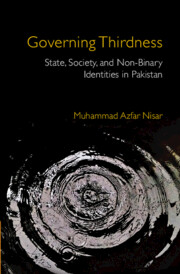Book contents
4 - Governance in the Khawaja Sira Community
Published online by Cambridge University Press: 10 December 2021
Summary
The subordinate status of a counterpublic does not simply reflect identities formed elsewhere; participation in such a public is one of the ways its members’ identities are formed and transformed. A hierarchy or stigma is the assumed background of practice. One enters at one's own risk (Warner 2002).
Individuals leaving or being thrown away from their families due to their perceived deviance from traditional notions of masculinity—whether that is because of their femininity, impotence, intersex characteristics, or some other reason—often end up joining the khawaja sira community soon afterwards. For a variety of reasons, the khawaja sira community is the only social group that welcomes them. Living alone is seldom an option for most individuals in Pakistan because society considers living as a family a normative ideal (Ebrahim 2013). This is especially the case for single women and the khawaja sira for whom renting rooms or apartments can be a nightmare given the reluctance of landlords and the (moral) suspicion with which they are viewed. Adult men in the vicinity can be a nightmare to deal with as a single woman or a khawaja sira, who often struggle to cope with the unwelcome advances of the men trying out their luck with what they often perceive as someone ‘open for business’. Moreover, as Cavalcante (2016) notes in the context of transgender lives, ‘[d]ue to the marginality and precariousness of gender variance, living a transgender life requires reliable structures of care and concern; structures that help to make the management of everyday life possible’ (118). The khawaja sira community through its extensive kinship system provides precisely this ‘structure of care’ where individuals discarded by their family find refuge.
For the khawaja sira, their community is a wide umbrella that gives shelter to all individuals who want to join them. Every new entrant, whether they are joining because of their femininity, impotence, or any other issue related to gender or sexuality, can find someone who can relate to their story within the khawaja sira community. In my observation, everyone appeared to be accepted with open arms within the community. There are certainly internal hierarchies and discourses of authenticity, especially between those who have undergone emasculation.
- Type
- Chapter
- Information
- Governing ThirdnessState, Society, and Non-Binary Identities in Pakistan, pp. 60 - 78Publisher: Cambridge University PressPrint publication year: 2022



